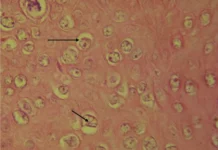A protruding mass from the vagina of a newborn girl.
A baby girl was born via a spontaneous vaginal delivery at 36 weeks of gestation. On examination of the neonate, a soft mass was found protruding from her external genitalia.
There were no complaints about her urinary or bowel habits. She was passing urine and feces regularly.
During the examination when the baby cried, the protruding mass increased in size. However, there was no abdominal distension. The rest of the examination was normal. She was able to pass urine and feces regularly, and renal function was normal.
During the prenatal period, an ultrasound that was performed in the third trimester of pregnancy had identified a pelvic mass in the fetus; however, no further investigations were performed before delivery.
An abdominal ultrasound was performed on the neonate, and it confirmed hydrocolpos, with vaginal distention, a normal uterus, and no urinary tract dilatation.
On the third day of birth, a hymenal incision was performed under anesthesia, consequently resolving the mass.
After 2 months of the procedure, a follow-up ultrasound was performed. There was no residual mass, and the urinary tract and internal genitalia appeared normal.
Hydrocolpos is cystic dilation of the vagina with fluid accumulation due to the stimulation of secretory glands of the reproductive tract secondary to vaginal obstruction. It is imperative to detect early and treat as it can compress the lower urinary tract, which may lead to obstructive uropathy, consequently resulting in hydronephrosis and hydroureters.
Congenital hydrocolpos, as seen in this patient, is quite rare, with a prevalence of less than 1:30,000; on the other hand, it is more common at puberty.
If hydrocolpos is secondary to the imperforate hymen, then incision with drainage is performed; if vaginal atresia is the cause, then clean intermittent catheterization or vaginostomy can be performed.
Prompt management is desirable to avoid life-threatening renal failure and urogenital infections. The prognosis of imperforate hymen is excellent when treated, so the best approach is to manage the neonates in time to avoid any complications.
References
Marine Butin, M. P. (2019, December 12). Neonatal Hydrocolpos. Retrieved from The New England Journal of Medicine: https://www.nejm.org/doi/full/10.1056/NEJMicm1905619




